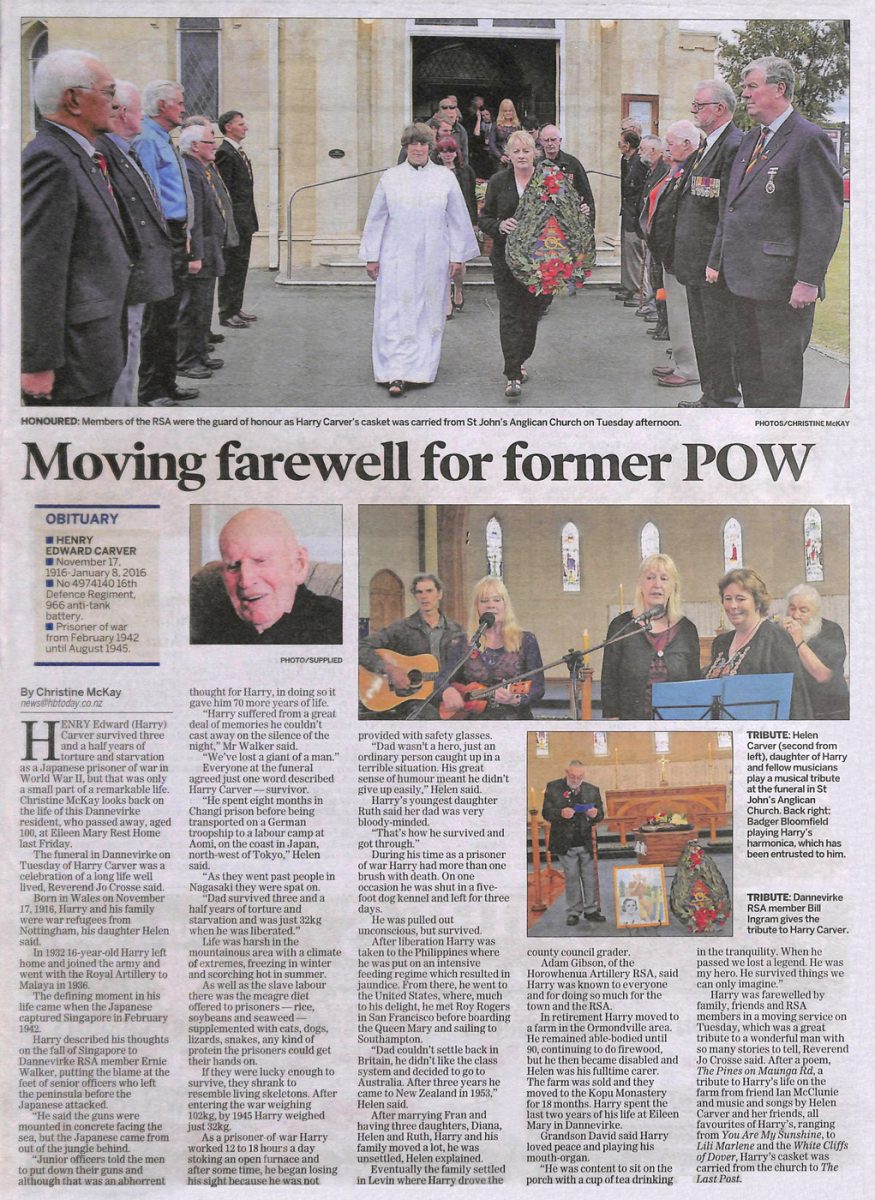Moving farewell for former POW
OBITUARY
HENRY EDWARD CARVER
November 17, 1916 – January 8, 2016
No 4974140 16th Defence Regiment, 966 anti-tank battery.
Prisoner of war from February 1942 until August 1945.
By Christine McKay
HENRY Edward (Harry) Carver survived three and a half years of torture and starvation as a Japanese prisoner of war in World War II, but that was only a small part of a remarkable life. Christine McKay looks back on the life of this Dannevirke resident, who passed away, aged 100, at Eileen Mary Rest Home last Friday.
The funeral in Dannevirke on Tuesday of Harry Carver was a celebration of a long life well lived, Reverend Jo Crosse said.
Born in Wales on November 17, 1916, Harry and his family were war refugees from Nottingham, his daughter Helen said.
In 1932 16-year-old Harry left home and joined the army and went with the Royal Artillery to Malaya in 1936.
The defining moment in his life came when the Japanese captured Singapore in February 1942.
Harry described his thoughts on the fall of Singapore to Dannevirke RSA member Ernie Walker, putting the blame at the feet of senior officers who left the peninsula before the Japanese attacked.
“He said the guns were mounted in concrete facing the sea, but the Japanese came from out of the jungle behind.
“Junior officers told the men to put down their guns and although that was an abhorrent thought for Harry, in doing so it gave him 70 more years of life.
“Harry suffered from a great deal of memories he couldn’t cast away on the silence of the night,” Mr Walker said.
“We’ve lost a giant of a man.”
Everyone at the funeral agreed just one word described Harry Carver – survivor.
“He spent eight months in Changi prison before being transported on a German troopship to a labour camp at Aomi, on the coast in Japan, north-west of Tokyo,” Helen said.
“As they went past people in Nagasaki they were spat on.
“Dad survived three and a half years of torture and starvation and was just 32kg when he was liberated.”
Life was harsh in the mountainous area with a climate of extremes, freezing in winter and scorching in hot summer.
As well as the slave labour there was the meagre diet offered to prisoners – rice, soybeans and seaweed
– supplemented with cats, dogs, lizards, snakes, any kind of protein the prisoners could get their hands on.
If they were lucky enough to survive, they shrank to resemble living skeletons. After entering the war weighing 102kg, by 1945 Harry weighed just 32kg.
As a prisoner-of-war Harry worked 12 to 18 hours a day stoking an open furnace and after some time, he began losing his sight because he was not provided with safety glasses.
“Dad wasn’t a hero, just an ordinary person caught up in a terrible situation. His great sense of humour meant he didn’t give up easily.” Helen said.
Harry’s youngest daughter Ruth said her dad was very bloody-minded.
“That’s how he survived and got through.”
During his time as a prisoner of war Harry had more than one brush with death. On one occasion he was shut in a five foot dog kennel and left for three days.
He was pulled out unconscious, but survived.
After liberation Harry was taken to the Philippines where he was put on an intensive feeding regime which resulted in jaundice. From there, he went to the United States, where, much to his delight, he met Roy Rogers in San Francisco before boarding the Queen Mary and sailing to Southampton.
“Dad couldn’t settle back in Britain, he didn’t like the class system and decided to go to Australia. After three years he came to New Zealand in 1953,” Helen said.
After marrying Fran and having three daughters, Diana, Helen and Ruth, Harry and his family moved a lot, he was unsettled, Helen explained.
Eventually the family settled in Levin where Harry drove the county council grader.
Adam Gibson, of the Horowhenua Artillery RSA, said Harry was known to everyone and for doing so much for the town and the RSA.
In retirement Harry moved to a farm in the Ormondville area. He remained able-bodied until 90, continuing to do firewood, but he then became disabled and Helen was his fulltime carer. The farm was sold and they moved to the Kopu Monastery for 18 months. Harry spent the last two years of his life at Eileen Mary in Dannevirke.
Grandson David said Harry loved peace and playing his mouth-organ.
“He was content to sit on the porch with a cup of tea drinking in the tranquillity. When he passed we lost a legend. He was my hero. He survived things we can only imagine.”
Harry was farewelled by family, friends and RSA members in a moving service on Tuesday, which was a great tribute to a wonderful man with so many stories to tell, Reverend Jo Crosse said. After a poem, The Pines on Maunga Rd, a tribute to Harry’s life on the farm from friend Ian McClunie and music and songs by Helen Carver and her friends, all favourites of Harry’s, ranging from You Are My Sunshine, to Lili Marlene and the White Cliffs of Dover, Harry’s casket was carried from the church to The Last Post.
Photo captions –
HONOURED: Members of the RSA were the guard of honour as Harry Carver’s casket was carried from St. John’s Anglican Church on Tuesday afternoon. PHOTOS/CHRISTINE McKAY.
TRIBUTE: Helen Carver (second from left), daughter of Harry and fellow musicians play a musical tribute at the funeral in St. John’s Anglican Church. Back right: Badger Bloomfield playing Harry’s harmonica, which has been entrusted to him.
TRIBUTE: Dannevirke RSA member Bill Ingram gives the tribute to Harry Carver.












Do you know something about this record?
Please note we cannot verify the accuracy of any information posted by the community.